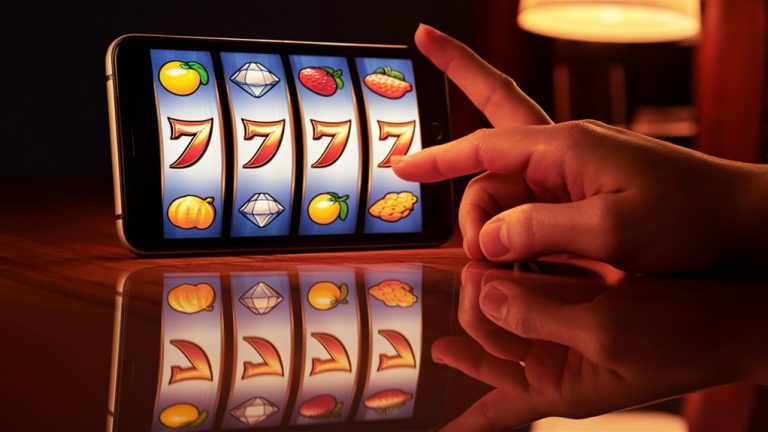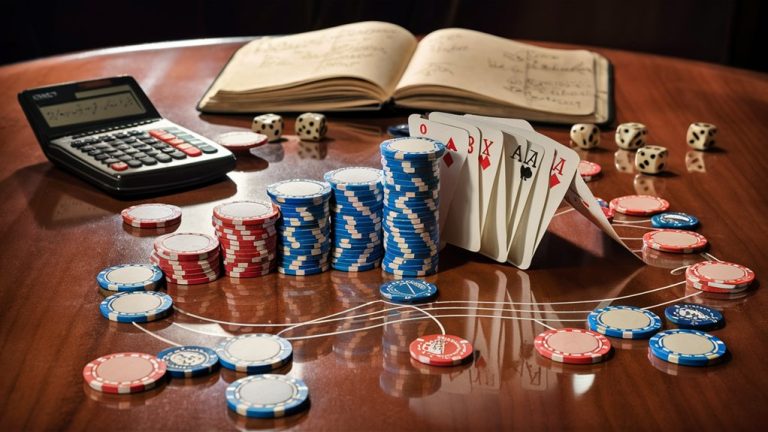
Win Big at Poker: The Top Guide

Key Math Basics
Pot odds and expected value are main parts of good poker. Get these math ideas and you make better choices. Keep a money plan with 20-30 buy-ins for cash games to last in the game.
Smart Moves in Position
Knowing your spot is key to winning in poker. Play wide in late spots and tight with good cards in early ones. This positional smart play helps you win more and lose less by choosing the best hands.
Deeper Mental Skills
Mastering body signs and keeping calm puts top players ahead. Poker wins need both skills and cool minds. Know how others bet and hide your own moves.
Tourney versus Cash Game Play
Each style of poker needs a different plan. Tourney poker means adjusting as stacks and blinds change, while cash games focus on steady gains over time. Knowing these changes helps players shine in both play styles.
Putting It All Together
Merge key skills and mental games for full strategy. Always work on getting better by looking at how you play. Balance your attack, choose positions, and use the math to keep making money at the tables.
Poker Math Made Simple: Key Ideas for Making Money
Important Poker Math
Pot odds are the math base you need to make money. This key figure tells when to play or pass on bets.
Advanced players use this to keep a game edge.
Expected Value (EV) and Choices
Expected Value (EV) is core for making cash long-term. It helps you:
- See returns each move could make
- Figure out gains in many spots
- Find the best bet plans
Like, facing a $100 bet for a 25% win chance at a $500 pot, good EV ($25) means a smart play over time.
Deep Math and Good Spot Play
Implied odds build on basic pot odds by thinking of future bets. Key points include:
- Using your spot for better reads on others
- Analyzing bet patterns to make smarter choices
- Tracking wins and detailed game logs
This tight math strategy gives your poker plan a data boost. Learn these ideas for steady wins and better game choices at all stakes.
Picking Hands and Playing Your Spot
Choosing Hands and Playing Spots in Poker
Smart Decisions Based on Your Spot
Being smart about your spot and choosing hands are key for great play. These skills set up good choices all through the game.
Know their link to use the best spots and protect yourself in bad ones.
Best Hands by Spot
Late-spot players (dealer button and cutoff) know more, so they play a wider set of starting hands like suited ties, middle pairs, and tricky hands to use their spot edge well.
In contrast, early spot play needs a tighter set, focusing on top hand groups such as big pairs (tens or more) and strong Ace-King sets.
Using Your Spot After the Flop
After-flop spot really changes your game. Being in a good spot lets you:
- Control the pot size by how you bet and raise
- Get more value from okay hands
- Bluff better with real-time reads on others
- Lessen losses against better hands
Own these spot tricks to max your edge in good times and save yourself in tough spots.
Winning Big with Poker Tells: How to Read Others
Body Signs and Moves
Player tells show key clues about the hands and plans they have in play. The type of body signs you can trust show up when things get tense, like when bets are big.
Watch for hand shakes, changes in how they breathe, and shifts in timing their bets.
Start With Basic Actions
Watch basics first to find signs of big hand changes. Look for:
- How they handle chips without thinking
- Shifts in how they sit
- Changes in voice
- How fast they bet
Smart Tips on Reading Tells
Reading tells well needs looking at many signs. Use bet patterns and spot plays to check the tells you see. Watch for fake signs by cool players who mix up their game. Stay calm and blend this with solid poker logic.
Common Signs from Players
Often, what players show means the opposite – strong shows might mean weak hands, while looking weak might hide strong hands. Watch for:
- How they move their chips
- Where their eyes go
- Delays in bets
- What they say
Using Tells in Your Choices
Use tells with a broad plan. Double-check what you see in many ways before big choices. Keep an eye on:
- Patterns you notice
- How they keep acting
- Mixing tells into your overall game
- Checking tells from many sides
How to Manage Your Poker Funds

Must-Know Money Tips
Good money handling is a must for lasting success in poker, and you need to keep game cash split from regular money. Cash game fans should have 20-30 buy-ins ready for their level, while tourney players need 50-100 buy-ins to manage bigger changes.
Rules to Cut Risk
Limit how much you can lose to protect your funds. Set a hard stop-loss rule at 5% of your whole bankroll each game, and be ready to change levels if you lose too much. The 50% profit rule – where you save half and put half back in – helps balance growing your funds.
Track Your Playing
Log every session to make smart choices based on data. Write down every buy-in, cash-out, and play time to find trends and spots to better your game. Pure poker success comes from playing smart, not just going with your gut.
Keep Your Money Safe
Sticking to proven money rules is key for a safe, growing game. This plan keeps you safe from running out and helps you make more over time. By choosing your stakes wisely and sticking to your money rules, you set up for steady growth in the tough poker world.
Lessen Risks Smartly
Change your stakes as your funds change. Move down in bad times to keep your money safe, and go up in good times to make the most of good swings. This smart way to keep your funds ensures you can keep playing and winning in poker.
Tourney vs Cash Game: Playing Smart in Each
Basic Play Differences
Tourney poker and cash game poker ask for different plans because the game setup changes. In tourneys, you have to handle rising blinds and the need to last, making it key to save chips early and play harder as blinds go up. Cash games keep blinds the same, letting you use a steady plan all game.
Chips and Risk Choices
Tourney Tips
Tourney chips mean more than just money – they are your life in the game. You can’t just buy back in after you’re out, so each choice matters a lot. Saving chips is very important, especially at big moments and near the money bubbles.
Cash Game Play
Cash game strategy is simpler as you can buy back any time. This lets you take bold moves and measured risks without the fear of being out of the game. You can focus purely on expected value without worrying about staying in.
Playing Your Spot Across Games
Knowing your spot matters in both styles but needs different moves. Tourney players should think about ICM (Independent Chip Model) when near payouts or bubbles. This means changing how wide you open and making more three-bets based on the game stage and chip counts. In cash games, keep your ranges steady and aim to max your expected value with smart spot play. Without tourney place worries, choices are more about the math, but still need deep game sense.
Top Bluffing Moves
Key Bluff Parts
Good bluffing needs five parts well mixed. Timing, how others see you, studying others, bet patterns, and playing your spot are what you need for top-level bluff tricks.
Get Timing and Look Right
Smart timing needs a story your bets tell that fits the hand you seem to have. Building a table look is a big tool – playing tight makes others respect your bold moves, making bluffs work better.
Know Your Opponents and Stay Steady
Knowing who you play against helps you pick when to try bluffs. Go for smart players who fold well, but not those who always call with strong hands. Keeping your betting similar with real hands and bluffs stops others from catching on to you.
Use Your Spot Well
Playing smart spots is big for bluffing. Late spots give you more info, making them best for smart bluffs. Early spot bluffs need more care since more players still have to act. Winning is not just about tricks but about making choices with good math when things line up well.
Smart Moves to Think About
- Keep timing tight with your story
- Grow a strong table look
- Watch how others tend to play
- Stay steady with your bets
- Make your spot count
Staying Cool and In Control at Poker
Keeping Emotions in Check
Staying tough is at the heart of winning poker, beyond even the best game plans. Top players stand out not just with smart moves, but by staying calm when it counts. A solid mental game often decides who wins and who folds under pressure. 먹튀검증 공식 추천 확인하기
Three Key Steps to Handle Tilt
1. Find What Bugs You
Spot what gets you mad and hurts your game:
- Tough losses
- Bold players
- Big losses piling up
- How the table feels
- Worries about money The Evolution of Casino Slot
2. How to Stay Cool
Make plans to keep calm:
- Try deep breaths
- Stick to playing smart
- Think long-term
- Use calm practices
3. Be Smart with Money
Tight money rules help keep you steady:
- Set clear limits
- Play at right levels
- Keep poker cash alone
- Track your plays tight
Ways to Stop Tilt Before It Starts
Being your best needs a solid plan for handling stress:
- Take smart breaks
- Write down game details
- Focus with calm exercises
- Get set before playing
- Stay in good shape for clear thinking
Focus on making strong choices all the time. Think process over quick results to build real toughness at the table.






